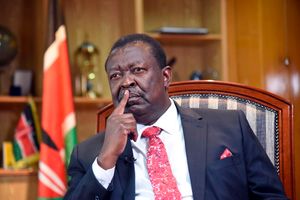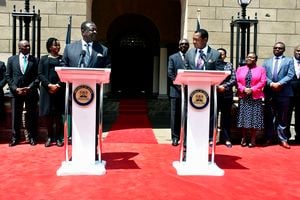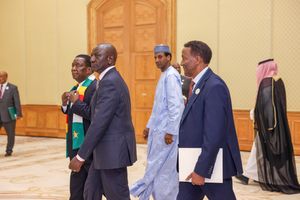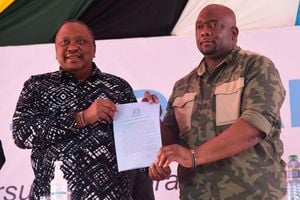
Kenyan President William Ruto (left) greets the President of Democratic Republic of Congo Felix Tshisekedi during an official visit to DRC, at the Palace of the Nationin Kinshasa on November 21, 2022.
Kenya is paying the price for abandoning its primacy as Africa’s neutral arbiter in regional politics and African conflicts, swapping its once revered status in diplomacy in favour of the current puddle-and-muddle foreign policy that has persistently put it at loggerheads with friendly countries.
The latest episode is the standoff between Nairobi and Kinshasa over a December 15 statement by a Democratic Republic of Congo rebels alliance that wants to oust President Felix Tshisekedi.
The announcement on Kenyan soil, has, as expected, angered President Tshisekedi who responded by recalling its ambassadors in Nairobi and Arusha, Tanzania.
While the dust seems to be settling, diplomatic experts think President William Ruto should appoint a special envoy to heal widening rift between the two countries, which had historically enjoyed cordial ties until 1997 following the ouster of strongman Mobutu Sese Seko by allied forces led by Laurent Desire Kabila, whose reign was cut short in 2001.
Nairobi’s slew of diplomatic misadventures has further been laid bare after the Congolese rebels and political leaders announced that they formed the alliance to unseat Tshisekedi, who was seeking a second term in the December 20 presidential poll that attracted 20 candidates.
Last week, Corneille Nangaa, a former DRC electoral body chairman, announced in Nairobi that he had created a political-military alliance with M23 rebels and other armed groups to restore peace in the mineral-rich east.
Intriguingly, the Alliance Flueve du Congo (Congo River Alliance – CRA) was unveiled in Nairobi, just days after DRC President Tshisekedi sent packing the East African Community Regional Force (EACRF) drawn from Kenya, Tanzania, Uganda, South Sudan and Burundi for supposedly failing to enforce peace in the conflict-weary eastern DRC.
It was not immediately clear if Tshisekedi has dispensed with the Nairobi peace process in favour of Luanda (Angola) mediation.
However, what is not in doubt is that DRC has embraced Southern Africa Development Community (SADC) as neutral arbiter in the multiple conflicts in eastern Congo, where March 23 Movement (M23) and Allied Democratic Forces (ADF), among others, have waged a bloody civil war for years.
“First, it would be interesting to know under what circumstances these people came to Kenya. Are they refugees and was there evidence that they were being persecuted in DRC to be granted immunity under international law to make public statements that have serious ramifications in DRC and the region (Great Lakes Region)?” asks Prof David K.A Kikaya, an international relations expert and Kenya’s former ambassador to the United Nations Environmental Programme.
As the diplomatic rift seemed to widen with DRC recalling its envoys in Kenya and Tanzania, Prof Kikaya recalls how former President Daniel arap Moi helped navigate the slippery political situation in DR Congo in 1996 before President Mobutu was deposed by a constellation of rebels that included Ugandan, Rwandan and Burundian mercenaries that bore no allegiance to any leader.
“As chairman of Igad (Inter-Governmental Authority on Development) then, Moi tried to convince Mobutu to exit quietly. Moi offered him a safety valve to leave DRC for exile in Kenya. Mobutu owned villas at the Kenyan coast and so it was going to be possible to protect him pending relocation to a third country.
Moi did not get involved in the conflict in Zaire (now DRC),” explains Kikaya. The past three regimes in Kenya, he says, have failed to maintain Kenya’s status as a neutral observer and arbiter in regional conflicts and politics as the country gets increasingly involved militarily.
It does not help matters that most high-profile office holders are novices in geopolitics and are bereft of etiquette and Nairobi risks being shunned for its growing belligerence, according to Prof Egara Kabaji, a former secretary in the Ministry of Foreign Affairs during President Mwai Kibaki’s reign.
“Many of the leaders we elected are inexperienced as so far us management of foreign affairs is concerned. Not everyone in government should comment on foreign affairs.
That is not their domain. It is a delicate matter that should be left only to the President and cabinet secretary in charge of Foreign Affairs,” explains Prof Kabaji.
Since coming to power, President Ruto and his ministers have been accused of carelessly aimed pot shots at foreign governments – especially in Africa – with disastrous results.
The latest was last week when Transport Cabinet Secretary Kipchumba Murkomen described Rwandan President Paul Kagame’s system of governance as a “autocracy”.
Prof Kabaji says: “In diplomacy, you should not always say the unpalatable behaviour of your counterparts. It does not help build relationships. Use better means of contributing to growth of others.”
More worryingly for Kenya, says former Attorney-General Githu Muigai, there are “many moving parts” in Kenya’s foreign policy after the adoption of the open visa policy that has swung the doors wider to foreigners.
“The standoff between DRC and Kenya has put Kenya in an embarrassing position. While it was not preventable because there was no prior evidence of what they were going to say or if the statement was a declaration of war in a friendly country.
"The rebels did not break visa conditions because they did not need a visa to come to Nairobi, which would have been used as a reason to kick them out,” explains Prof Muigai, a constitutional and international law expert and lecturer at the University of Nairobi.
Until 2002 when the National Rainbow Alliance (Narc) under President Mwai Kibak came to power, Nairobi had carved out unmatched reputation as the unchallenged host of African conflicts mediation.
The foreign policy that took root during the reign of founding President Jomo Kenyatta and his successor Moi made Kenya an anchor of African conflict resolution, with the Kenya Defence Forces (KDF) being the goto military for peacekeeping missions in Angola, Namibia, Sierra Leone, Liberia, the defunct Yugoslavia, East Timor and many others.
Prof Kikaya observes that Kenya veered off into the current puddle-and-muddle foreign policy when it began getting involved militarily in regional conflicts, which in turn meant “it would at some point take sides with some factions in the conflicts – like it happened during the Machakos round of Somalia peace talks”.
Consequently, foreign policy experts say, by allowing CRA that comprises M23 among other armed groups, Kenya had broken diplomatic etiquette to the chagrin of President Tshisekedi.
The announcement soured relations between DRC and EAC and Kinshasa took the unprecedented decision to bar EAC observers from monitoring the elections held on December 20.
President Ruto and Foreign Minister Musalia Mudavadi have both said Kenya does not support the new coalition but had no reason to arrest its leaders in Nairobi as requested by the DRC government.
And it is not the first time President Ruto has rubbed Tshisekedi the wrong way. During the 2022 presidential election campaign, Ruto – then deputy president – kicked up a diplomatic storm when he claimed the people of DRC were busy singing and did not have livestock to produce enough milk for a country of more than 100 million people.
Prof Muigai says diplomatic etiquette does not stop the dissidents from speaking as they are covered by the international law as well the Kenyan law that guarantees everyone – foreign and local – the freedom of speech.
In political circles, the emergence of CRA in Nairobi has been described – without qualification – as the reaction a “jilted lover”.
Tshisekedi has not shied away from rapping the presence of EAC force as a liability and a conduit for illicit appropriation of DRC minerals resources, especially gold.
President Tshisekedi has had a strained diplomatic relations with Nairobi since 2022 following the deployment of KDF peacekeepers. Tshisekedi has accused the peacekeepers from Kenya, Uganda and Rwanda of abetting gold smuggling in eastern DRC.
While he has not provided irrefutable evidence to bolster his allegations, the country’s ministry of finance published early this year a report that shows DRC exported 2,220 tonnes of coltan last year while gold exports fell to just over 28 tonnes.
US Treasury estimates the gold exports were much higher as most of the minerals are “smuggled” to countries including Rwanda, Uganda and Kenya.








